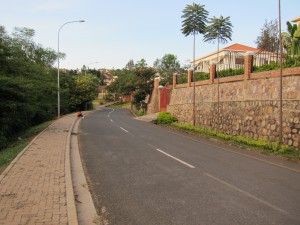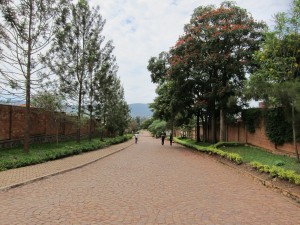In two days this was probably my most surprising realisation in the nation: It’s a police state. Not the bat-shit-insane, limb-chopping, atrocity-sprouting, textbook, African-dictator style police tyrany state, but more the East Germany, Cuban, Soviet, 1984-style police state. With some extra Kalashnikovs to spice things up.
I heard of numerous incidents of people being critical of the government while talking in a small circle of friends, only to be picked up by secret police the very next day. Sometimes it’s ‘only’ to be interrogated before being allowed to return home, aware that this is the end of their freedom (of expression). A more visible sign of this is a massive military and police presence (both with AK47s) in the capital and throughout the country (though in parts this might also be attributed to recent, anonymous, grenade attacks in Kigali).
However, I’ve also seen a lot of good things. The country is in general considered safe and stable and it’s possible to walk the streets at any time of the day (or night). Economy-wise things are also picking up and the country featured a solid growth rate over the last few years. There’s a decent road network throughout the major routes in the country, even though in parts it can get a little bumpy. In light of this, foreign criticism of the regimes human rights violations remain comparatively subdued.
The second major surprise I encountered was the state of corruption. Apparently the countries strong-handed, long-time leader for 16 years (first indirectly, now directly as president), Paul Kagame, has taken to a zero tolerance approach to corruption. While as a traveler the non-existence of corruption at different government levels is hard to verify, it’s a claim that I heard several times in the country. Given the strong grip he has on the country, that’s an endeavor one might not have expected to be untertaken.
In a lot of developing countries, stamping out corruption would be hard to do for a president. After all, the people who can make or break the government – the military – often have a strong interest in keeping it alive. Taking too hard a stance on that can result in a government very quickly finding itself out on the street. Things in Rwanda might be different, given that Kagame himself is a military strongmen who started out handling internal security in Uganda. His experience, background and autocratic leadership might explain how he was able to bring something like this about
.
The tough approach continues on all levels. Governments of other developing nations might leave the (unofficial) taxation of small-time commerce to local police men – practicing a low-overhead approach to paying the income of said police men. Not Rwanda. Reportedly, the government has agents walking around small markets, logging incomes of small sellers and taxing them accordingly. Small commerce taxation seems finance the provincial governments – and given a lack of larger businesses capable of generating serious taxation revenues, every Rwandan Franc counts.
Overall, it seems a little bit like an African China, except, instead of foreign direct investment, there’s foreign aid. And the amount of foreign aid the country receives is certainly impressive. It seems that the NGO that doesn’t have an office in Kigali has yet to be founded. From ‘Send a Cow’ to the ‘Adventist Development and Relief Agency’ it appears that the international-guilt-associated country name is some serious ammunition when it comes to raising funds and awareness. Whether that’s a boon or a bain is hard to tell – after all, the very same image that helps in securing aid funding, might seriously hamper the country’s ability to attract tourism income.
The level of NGO involvement started to become apparent already while I was waiting to board my flight to Kigali. Aid worker vests, kindles, jeans, trainers and a distinct lack of banker hair cuts characterize the typical white passenger. The sheer number of them seems surprising – however, a lack of a substantial, local, middle-class is what really makes them stand out. Where it’s common in Thailand to see a very mixed crowd in coffee shops and airports alike, in Kigali things lean much more into one direction.


Leave a Reply